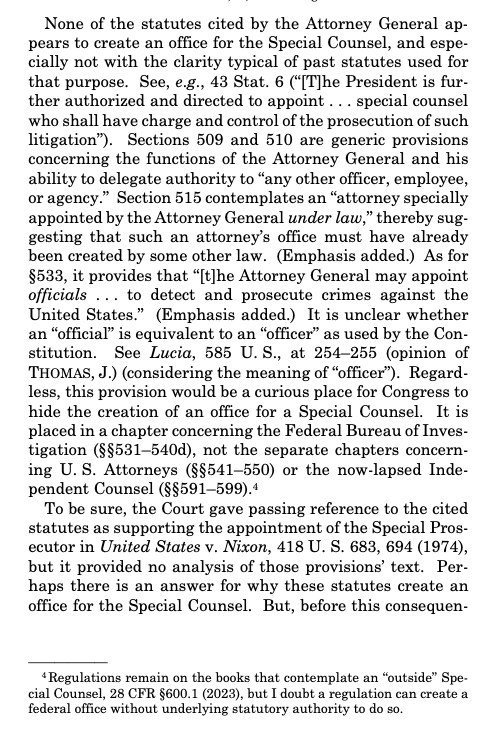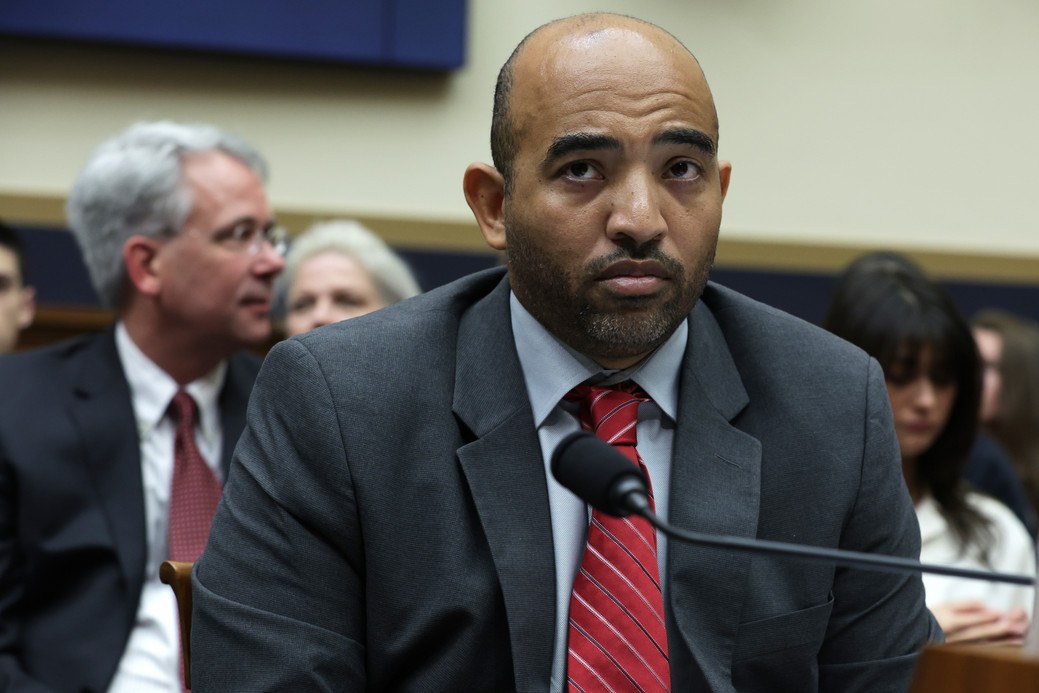Justice Thomas' concurrence in Trump v. U.S. is hugely significant. He questions whether Special Counsel Jack Smith's office is constitutional.
"If there is no law establishing the office that the Special Counsel occupies, then he cannot proceed with this prosecution. A private citizen cannot criminally prosecute anyone, let alone a former President." supremecourt.gov/opinions/23pdf…
"If there is no law establishing the office that the Special Counsel occupies, then he cannot proceed with this prosecution. A private citizen cannot criminally prosecute anyone, let alone a former President." supremecourt.gov/opinions/23pdf…
Justice Thomas:
"We cannot ignore the importance that the Constitution places on who creates a federal office. To guard against tyranny, the Founders required that a federal office be 'established by Law.' As James Madison cautioned, '[i]f there is any point in which the separation of the Legislative and Executive powers ought to be maintained with greater caution, it is that which relates to officers and offices.' 1 Annals of Cong. 581. If Congress has not reached a consensus that a particular office should exist, the Executive lacks the power to create and fill an office of his own accord."
"We cannot ignore the importance that the Constitution places on who creates a federal office. To guard against tyranny, the Founders required that a federal office be 'established by Law.' As James Madison cautioned, '[i]f there is any point in which the separation of the Legislative and Executive powers ought to be maintained with greater caution, it is that which relates to officers and offices.' 1 Annals of Cong. 581. If Congress has not reached a consensus that a particular office should exist, the Executive lacks the power to create and fill an office of his own accord."
Justice Thomas launches a legal missile at AG Merrick Garland:
"It is difficult to see how the Special Counsel has an office 'established by Law,' as required by the Constitution"
"...None of the statutes cited by the Attorney General appears to create an office for the Special Counsel, and especially not with the clarity typical of past statutes used for that purpose"
"...Even if the Special Counsel has a valid office, questions remain as to whether the Attorney General filled that office in compliance with the Appointments Clause"


"It is difficult to see how the Special Counsel has an office 'established by Law,' as required by the Constitution"
"...None of the statutes cited by the Attorney General appears to create an office for the Special Counsel, and especially not with the clarity typical of past statutes used for that purpose"
"...Even if the Special Counsel has a valid office, questions remain as to whether the Attorney General filled that office in compliance with the Appointments Clause"



Justice Thomas: "In this case, there has been much discussion about ensuring that a President 'is not above the law.' But, as the Court explains, the President’s immunity from prosecution for his official acts is the law...
Respecting the protections that the Constitution provides for the Office of the Presidency secures liberty. In that same vein, the Constitution also secures liberty by separating the powers to create and fill offices. And, there are serious questions whether the Attorney General has violated that structure by creating an office of the Special Counsel that has not been established by law. Those questions must be answered before this prosecution can proceed. We must respect the Constitution’s separation of powers in all its forms, else we risk rendering its protection of liberty a parchment guarantee."
Respecting the protections that the Constitution provides for the Office of the Presidency secures liberty. In that same vein, the Constitution also secures liberty by separating the powers to create and fill offices. And, there are serious questions whether the Attorney General has violated that structure by creating an office of the Special Counsel that has not been established by law. Those questions must be answered before this prosecution can proceed. We must respect the Constitution’s separation of powers in all its forms, else we risk rendering its protection of liberty a parchment guarantee."
My write-up of Justice Thomas's concurrence questioning the constitutionality of Special Counsel Jack Smith's office/appointment @FDRLST thefederalist.com/2024/07/02/cla…
• • •
Missing some Tweet in this thread? You can try to
force a refresh



























